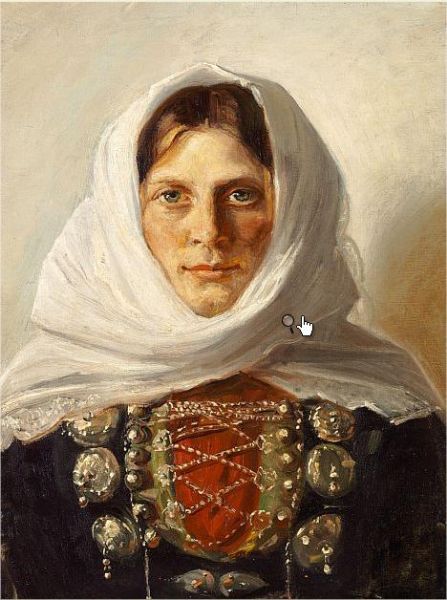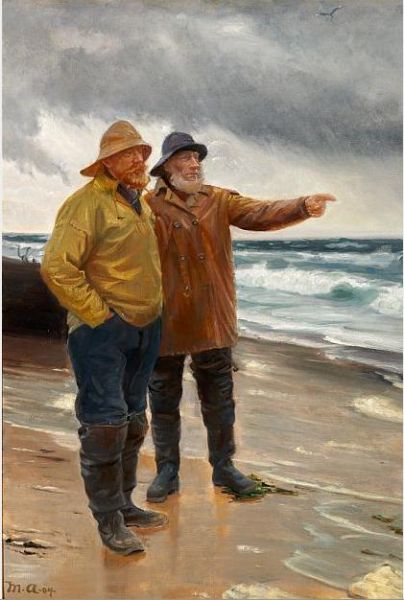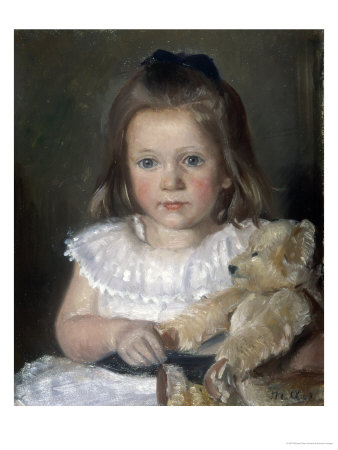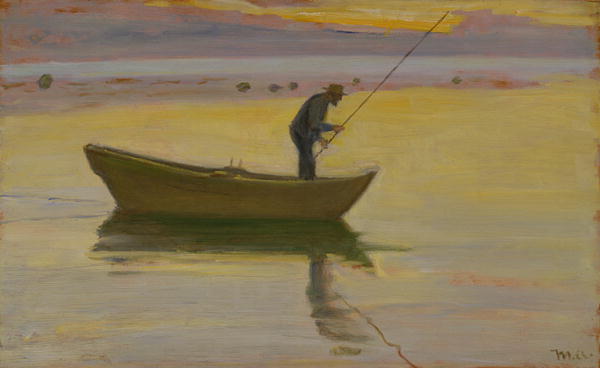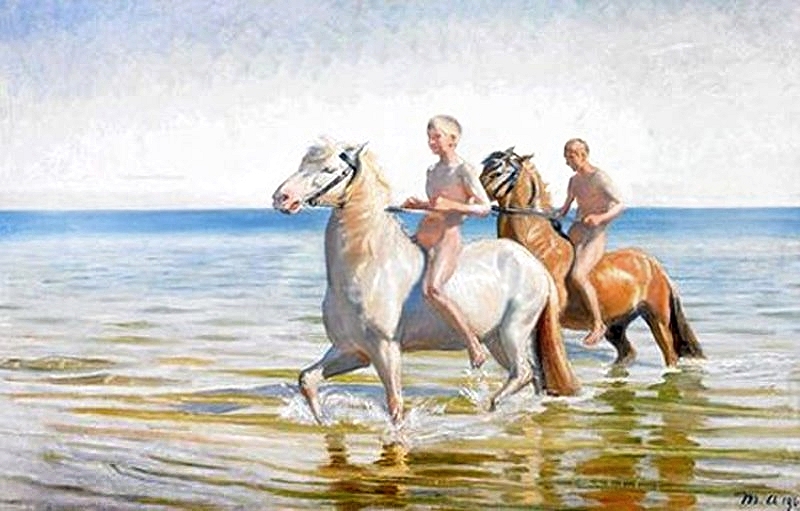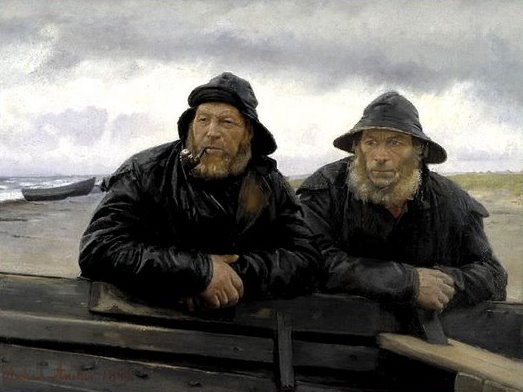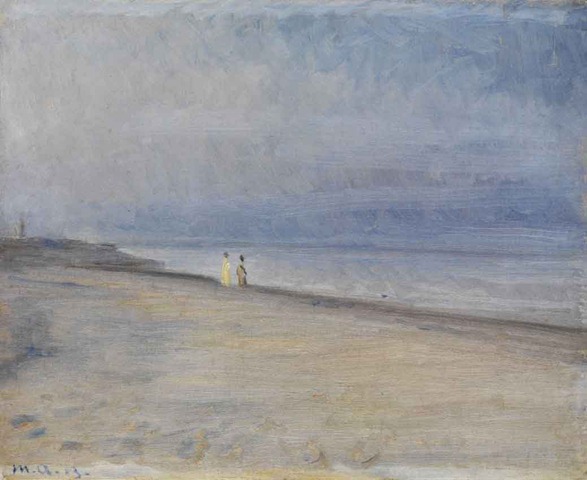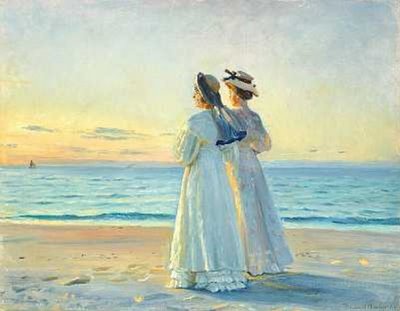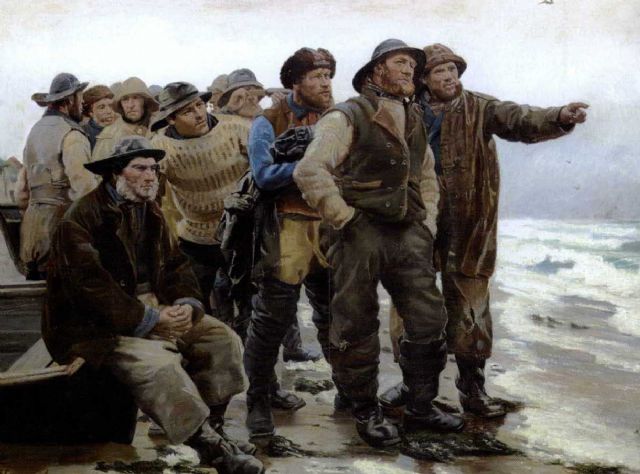<Back to Index>
- Classical Scholar Daniel Heinsius, 1580
- Painter Michael Peter Ancher, 1849
- King of Poland Władysław IV Vasa, 1595
PAGE SPONSOR


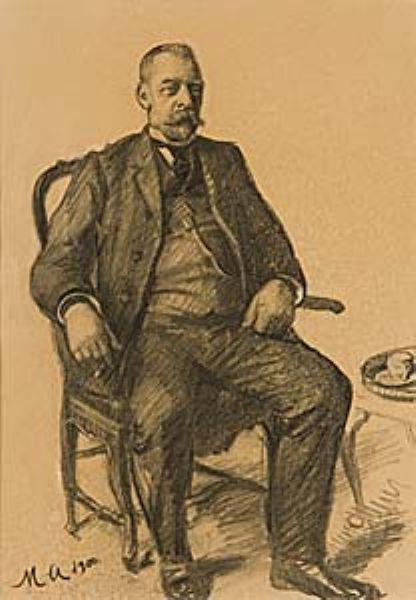
Michael Peter Ancher (June 9, 1849 – September 19, 1927) was a Danish impressionist artist. He is most associated with his paintings of fishermen and other scenes from the Danish port of Skagen. His paintings are classics and he is probably one of Denmark's most popular artists.
Michael Peter Ancher was born at Rutsker on the island of Bornholm. He studied at the Royal Danish Academy of Art (Det Kongelige Danske Kunstakademi) in Copenhagen (1871 - 75), where his teachers Wilhelm Marstrand and Frederik Vermehren encouraged his interest in genre painting. Here he also met Karl Madsen, who would later become Skagen Museum's first director and who invited him to travel to Skagen. A group of artists had congregated to form the Skagen Painters in Skagen, a small fishing village in the north of Denmark, situated where the Baltic and North Sea converge.
After
Ancher first visited Skagen in 1874, he settled there joining the
growing society of artists. The colony of painters regularly met in the
Brøndums Hotel in Skagen in order to exchange ideas. In 1880
Ancher married fellow painter and Skagen native Anna Brøndum,
whose father owned the Brøndums Hotel. In the first years of
their marriage, the couple had a home and studio in the "Garden House",
which is now in Skagen Museum garden. After the birth of his daughter
Helga in 1883 the family moved to Markve in Skagen. He got his artistic breakthrough in 1879 with the painting Vil han klare pynten (Will he Round the Point?).
Michael Ancher's works are true to life depictions of reality and at
the same time monumental figure compositions. Michael Ancher's life's
work is founded on the heroic series The Lifeboat is Carried Through The Dunes (1883), The Crew Are Saved (1894) and The Drowned Man (1896). Michael Ancher was influenced by his traditional training at the Royal Danish Academy of Fine Arts in
the 1870s which imposed strict rules for composition, and he found it
difficult to adjust to Scandinavian painting's modern breakthrough, the
"Skagen School". His marriage to Anna Ancher did,
however, introduce him to the naturalistic concept of undecorated
reproduction of reality and its colours. By combining the pictorial
composition of his youth with the teachings of naturalism, Michael
Ancher created what has been called modern monumental figurative art
such as A Baptism. The works of Anna and Michael Ancher can be seen at the Skagen Museum, the Royal Museum of Fine Arts, the Frederiksborg Museum, The Hirschsprung Collection and Ribe Art Museum. Michael Ancher received the Eckersberg Medal in 1889 and in 1894 the Order of the Dannebrog. Originally their paintings hung in the dining room of the Brøndums Hotel. The painter P.S. Krøyer conceived
the idea of placing paintings by different artists in the wall panels.
In 1946 the dining hall was donated to the Skagen Museum. The
Skagen residence of Anne and Michael Ancher was purchased in 1884. In
1913, a large studio annex was added to the property and this also
forms part of what is on display today. Upon her death in 1964,
Ancher's daughter, Helga, left the house and all of its contents to a
foundation. The former residence was restored and opened as a museum
and visitor attraction. In
1967 Michael and Anna Ancher's house was turned into a museum by the
Helga Ancher Foundation. Michael and Anna Ancher's house (Anchers Hus) in Skagen has
been converted to a museum and is open to the public for tours.
Original furniture and paintings created by the Anchers and other
Skagen artists are shown in the restored home and studio. Art
exhibitions are arranged in Saxilds Gaard,
another building on the property. This house is filled with displays of
paintings by Michael and Anna Ancher as well as those from many other
Skagen painters who made up their circle of friends.
Anna and Michael Ancher are currently featured on the front side of the DKK1000 bill.
The current version of this bill came into circulation on 25 November
2004. The front of the banknote has a double portrait of Anna and
Michael Ancher, derived from two 1884 paintings by Peder Severin Krøyer, which originally hung on the walls in the dining room at Brøndums Hotel.


